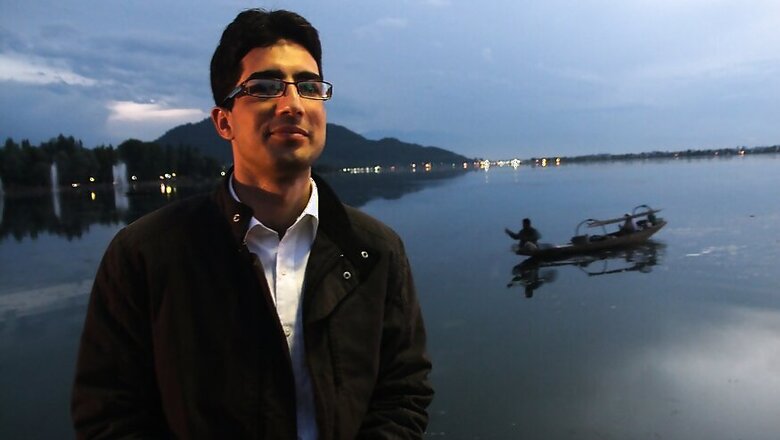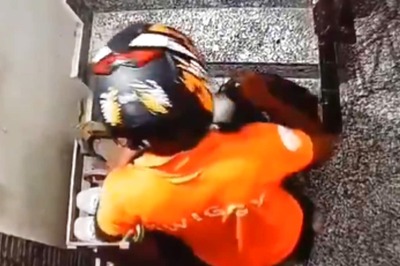
views
Civil servants in India are governed by Conduct Rules viz., All-India Services (Conduct Rules) 1968 and Central Civil Services (Conduct Rules) 1964.
Para 7 of the All-India Service (Conduct Rules), states the following:
7. Criticism of Government - No member of the Service shall, in any radio broadcast or communication over any public media or in any document published anonymously, pseudonymously or in his own name or in the name of any other person or in any communication to the press or in any utterance, make any statement of fact or opinion -
i. Which has the effect of an adverse criticism of any current or recent policy or action of the Central Government or a State Government; or
ii. Which is capable of embarrassing the relations between the Central Government and any State Government; or
iii. Which is capable of embarrassing the relations between the Central Government and the Government of any Foreign State: Provided that nothing in this rule shall apply to any statement made or views expressed by a member of the Service in his official capacity and in the due performance of the duties assigned to him.
Rule 3 of the Conduct Rules is an over-arching rule. It states the following:
3(1) Every member of the Service shall at all times maintain absolute integrity and devotion to duty and shall do nothing which is unbecoming of a member of the Service.
(1A) Every member of the Service shall maintain:
(i) High ethical standards, integrity and honesty;
(ii) Political neutrality;
(iii) Promoting of the principles of merit, fairness and impartiality in the discharge of duties;
(iv) Accountability and transparency;
(v) Responsiveness to the public, particularly to the weaker section;
(vi) Courtesy and good behaviour with the public.
3(2) Every member of the Service shall take all possible steps to ensure integrity of, and devotion to duty by, all Government servants for the time being under his control and authority.
(2A) Every member of the service shall in the discharge of his duties act in a courteous manner and shall not adopt dilatory tactics in his dealings with the public or otherwise.
(2B) Every member of the Service shall:-
(i) Commit himself to and uphold the supremacy of the Constitution and democratic values;
(ii) Defend and uphold the sovereignty and integrity of India, the security of State, public order, decency and morality;
(iii) Maintain integrity in public service;
(iv) Take decisions solely in public interest and use or cause to use public resources efficiently, effectively and economically; ... etc
Mr Shah Faesal has been charged with "failing in maintaining absolute honesty and integrity in discharge of official duty and thus acted in a manner unbecoming of public servant".
Rule 3(1) is wide-ranging, but this rule serves the specific purpose of covering acts of misconduct by a civil servant not covered by other specific provisions of the conduct rules. Where action is taken under Rules 3(1), particularly on grounds of unbecoming conduct, special care should be taken to eliminate cases of trivial nature. In SR Biswas vs Collector of Customs, AIT 1964 Cal. 415, the Calcutta High Court made the following observations:
“It is sometimes argued with sophistry that it is difficult to prescribe the outer limits of integrity in a complex system of modern administration, in which considerations of expediency occasionally outweigh other considerations. Considerations of expediency may be irresistible but their evils are merely to put up with and not be extolled or prescribe standards of life and work. If a public officer is required to maintain integrity and to be devoted to duty, he is merely asked to keep within the bounds of that administrative decency, which goes by the name of civil administration.”
What conduct is ‘unbecoming’ of a government servant has not been defined or explained in the conduct rules. According to Webster’s dictionary, the word ‘unbecoming’ means ‘unsuitable’, ‘indecorous’, ‘improper’.
“In the light of the ordinary dictionary meaning of the word, a conduct which is indecent, reprehensible or abominable involved moral though not legal lapses, is conduct unbecoming of a Government servant.” (R. Srinivasan vs Union of India, 1982, Madras HC).
In the case of Golam Mohiuddin vs State of West Bengal, AIT 1964, the Calcutta High Court held that the rule was elliptic and was vague, while the AP High Court in P Khaja Khan vs PMG AP, 1975 (2) SLR 417 held that the rule was not vague.
GB Singh, Advocate-on-Record, Supreme Court in his book Commentary on Conduct Rules, states that “the said rule should be applied with caution and care”.
It becomes imperative to define some rules in the Conduct rules clearly and substantively.
As regards social media, a committee was formed in 2016 for amendments to conduct rules. However, the decisions are still awaited.
The problem has arisen as social media has blurred the distinction between the private and public sphere.
The conduct rules for civil servants put restrictions on them in expressing themselves on a public platform. The restrictions are basically to ensure that civil servants remain apolitical.
But many civil servants wrongly assume that publicly identifying with the political and ideological position of a ruling party is fine. The fact remains that identifying with a ruling party is as much a political act as criticism of the government policy and hence, wrong.
There are many examples of civil servants identifying with a ruling party; as senior as an Additional Chief Secretary in Rajasthan and a Principal Secretary in Karnataka.
A civil servant is bound by his/her oath to the Constitution and must remain apolitical.
It is also to be understood that civil servants are not robots and have views on different issues. But at the same time, a civil servant is in a ‘servant–master’ relationship with the government whether State or Union. And as an employee, the civil servant cannot criticise the employer, i.e. the government.
So is Mr Shah Faesal’s tweet unbecoming or critical of the government?
His tweet could be a manifestation of helplessness we civil servants feel, with macabre crimes taking place and unable to do anything about it. A catharsis. A sensitive civil servant would feel hurt and disturbed. Maybe his tweet is only a sociological generalisation and a comment on the falling moral values of society at large. Only his reply to the charges by the state government can clear that. Is Faesal’s equation in his tweet a violation of conduct rules? I leave it to the reader’s judgement, as I too am bound by conduct rules.
Social media today is an extension of the private space of an individual. It provides individual the space for interaction with fellow-citizens.
The public sphere as defined by Jurgen Habermas (German sociologist and philosopher in the tradition of critical theory and pragmatism) has collapsed into the extended private sphere. Hence, the conduct rules related to engagement on social media, may need to be reviewed, to be commensurate with the boundaries of private sphere.
(The author is a civil servant. Views are personal)




















Comments
0 comment